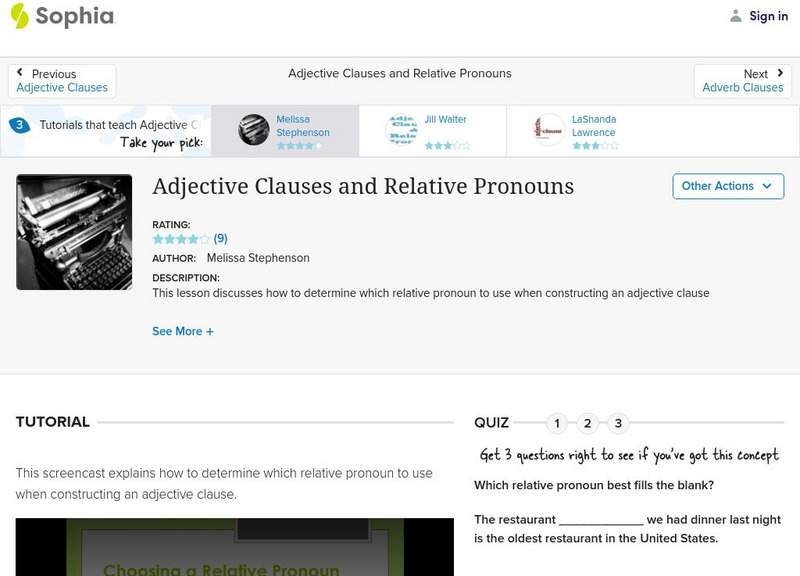Curated Video
Pronouns Everywhere! I Know Which Kind to Use!
Mr. Griot discusses subject, object, possessive, and relative pronouns. He then demonstrates the function and use of each in sentences.
Curated Video
Substitute, Please!
Mr. Griot focuses on subject, object, and relative pronouns and demonstrates how these function in a sentence.
Curated Video
Who, That, or Which? Necessary IELTS Grammar - IELTS Energy Podcast 1299
How can you know which relative pronoun to use on IELTS Speaking and Writing? Who, Which, or That? Today you'll find out and we'll share band 9 example sentences for the highest vocabulary scores.
The Learning Depot
How to Reduce the Adjective Clause: Relative Clause Reduction
An adjective clause, also known as an adjectival, or relative clause is a dependent clause that modifies a noun or a pronoun. In effect, this clause functions as one part of speech: the adjective. Why would you want or need to reduce the...
The Learning Depot
ADVANCED LESSON: How to Reduce the Adjective Clause: Relative Clause Reduction
An adjective clause, also known as an adjectival, or relative clause is a dependent clause that modifies a noun or a pronoun. In effect, this clause functions as one part of speech: the adjective. Why would you want or need to reduce the...
Learn German with Herr Antrim
German Accusative Case Master Class - Everything You Will Ever Need to Know
Join me for a live master class about the accusative case in German. Learn everything you will ever need to know about the accusative case in this hour long master class. This lesson includes the accusative case as used with direct...
The Learning Depot
Noun Clauses: Advanced English Grammar | A Noun Clause is a Part of Speech Classed as a Noun
A subordinate or dependent clause that acts as a noun is called a noun (or substantive) clause. When a simple noun is not enough to represent a person, place, thing, or idea, we use a noun clause.
A noun clause usually begins with...
The Learning Depot
Adjective Clauses: An Adjective Clause is a Part of Speech Classed as an Adjective
An adjective clause, also known as an adjectival, or relative clause is a dependent clause that modifies a noun or a pronoun. In effect, this clause functions as one part of speech: the adjective. Adjective clauses will always begin with...
Curated Video
Using Relative Pronouns: Who and That
Writers use relative pronouns to make their writing more specific and less wordy. Let's practice using the relative pronouns "who" to refer to people and "that" to refer to things.
Curated Video
Non-Defining Relative Clauses - English Grammar Explained
What are non-defining relative clauses? In this lesson, the English grammar is explained along with examples.
Learn German with Herr Antrim
German Relative Pronouns & Clauses
WHAT? HUH? The word "die" is in this sentence 8 times and there isn't a noun to be seen. What is going on here? Wenn die, die reinwollen, die, die rauwollen, nicht rauslassen, dann können die, die rauswollen, die, die reinwollen, nicht...
Turtle Diary
Turtle Diary: The Five Relative Pronouns
This video explains when to use each of the five relative pronouns correctly.
Sophia Learning
Sophia: Adjective Clauses and Relative Pronouns
This lesson discusses how to determine which relative pronoun to use when constructing an adjective clause. This tutorial lesson shares a short screencast [3:42] and review questions over the lesson's content.
Khan Academy
Khan Academy: That Versus Which
Much has been made of the distinction between 'that' and 'which' in English, but it can mostly be summed up in two points: 1. 'That' doesn't work so well with commas. 2. 'Which' doesn't work so well with people. David the Grammarian...
Khan Academy
Khan Academy: Relative Clauses
A relative pronoun is a word like "that" or "which" or "who", so a relative clause is a clause that begins with a relative pronoun. In the sentence "The dragon who breathed blue fire has retired," "who breathed blue fire" is a relative...
Khan Academy
Khan Academy: Relative Pronouns
We use the relative pronouns to connect clauses together, like 'the man *who sold the world* is coming over for dinner.' David, KA's Grammar Fellow, explains.
Sophia Learning
Sophia: Pronoun Types: Lesson 2
This lesson discusses different types of pronouns, including personal, possessive, reflexive, relative, demonstrative, indefinite and reciprocal. It is 2 of 3 in the series titled "Pronoun Types."






